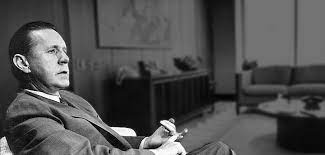By the time J.B. Fuqua died in 2006, he was known as the father of the modern conglomerate corporation, and he had amassed a giant fortune.
What people might not know is that Fuqua’s was a rags to riches story, and it began right here in Augusta.
J.B. Fuqua was fascinated as he grew up with the new invention of radio. Living on a small family tobacco farm in Virginia, he didn’t have the resources to go to college and study his passion, so he sent requests to borrow books from Duke University and educated himself at night after the chores were done.
By the age of 17, Fuqua had obtained his radio operators license.
Upon his first opportunity, Fuqua left the farm and joined the Merchant Marine as a radio operator, putting his book knowledge to the test. It was during those long hours at sea that Fuqua began to develop his plan for the future.
He was going to create his own radio station using other people’s money.
Barely aged 22, Fuqua borrowed a car, packed his one and only Sunday suit and headed off to Augusta. Fuqua, the engineer, picked Augusta because of the terrain being very suitable for AM radio waves. A relatively low power radio station could cover a huge area.
When Fuqua arrived in Augusta, he went straight to the Chamber of Commerce and asked for the names and addresses of Augusta’s three richest men. He arranged meetings with all of them.
Fuqua’s plan was to convince the men to put up the money for his radio station and to give him partial ownership of the business if he accepted a miserly salary. When the men found out he was broke and couldn’t put up money himself, they asked him what he brought to the table. Fuqua pointed to his head and said:
“I bring to the table what is up here.”
In no time, Fuqua’s station, WGAC became not only a financial success, it also became an innovator in the still infant form of broadcasting. Fuqua tinkered with the transmitters and microphones. He studied acoustics and perfected the sound dampening techniques still in use in radio today.
Then he abruptly sold his shares back to the other owners of WGAC and walked away with a modest profit. Fuqua had become interested in the new technology of television. Fuqua pocketed his profits from the sale of the radio station and planned to do the same thing over again, only this time, he would — eventually — be the sole owner of his new venture.
The cocky young entrepreneur gave his own initials to his new enterprise: WJBF television.
WJBF instantly became an industry leader, airing local shows such as Today In Dixie, which launched the career of comedy legend Jim Nabors. WJBF was also one of the first television stations to hire a Black news anchor at a time when that simply was not done in the Deep South.
In the following years, Fuqua used his business formula to go on a buying spree. Any business that interested him and he felt he could improve, he bought using other people’s money.
Eventually, Fuqua Industries would acquire Royal Crown Cola, Snapper Lawn Mowers, Martin Theaters, Claussen’s Bakeries, Willingham Automobile Finance Company, Georgia Federal Bank and Natco, a brick and tile manufacturer.
Fuqua would go on to serve three terms in the Georgia General Assembly and was widely credited with being the force behind building the Governor’s Mansion in Atlanta.
Later in life, Fuqua turned to philanthropy. He gave $40 million alone to Duke University, a school he never attended but that had played a role in his education nonetheless. The university responded by naming its business college in his honor.
Today, the J.B. Fuqua Foundation continues giving away Fuqua’s wealth funding grants in health and education as well as human and social services.
The legacy of J.B. Fuqua is history that should be remembered, and it all started right here in Augusta.
…And that is something you might not have known.
Scott Hudson is the Editorial Page Editor of The Augusta Press. Reach him at scott@theaugustapress.com










